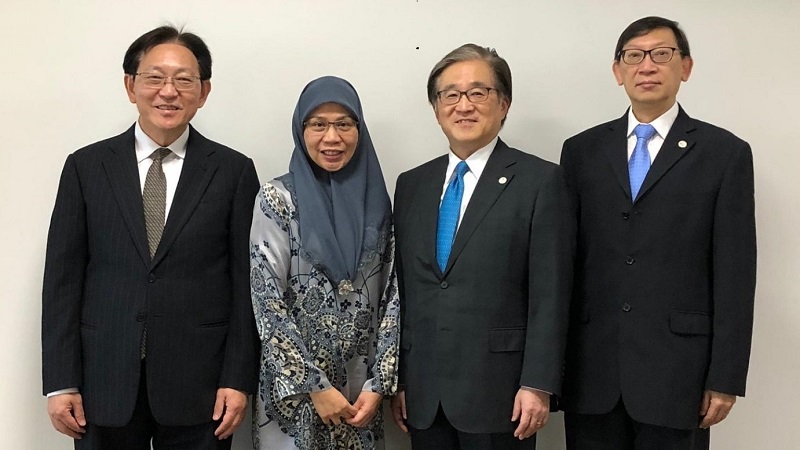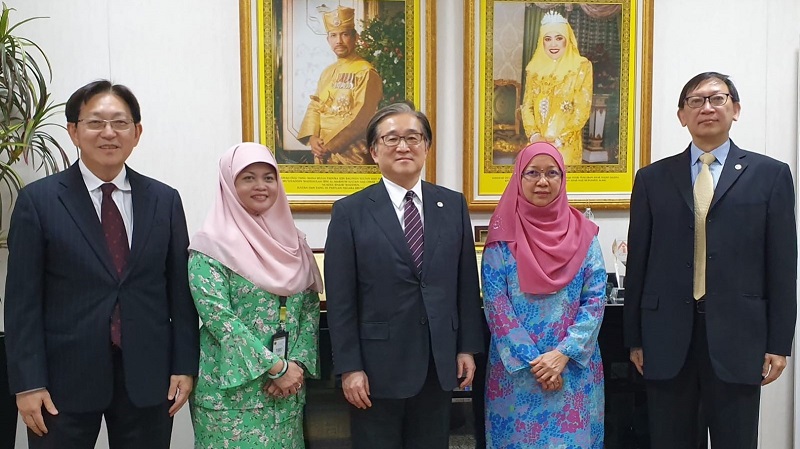
From left to right: Dr. Hoe Ee Khor, AMRO Chief Economist; YM Dayang Hajah Norliah binti Haji Kula, Permanent Secretary (Policy and Fiscal), Ministry of Finance and Economy (MOFE); Mr. Toshinori Doi, AMRO Director; and Dr. Siu Fung Yiu, AMRO Lead Economist.
SINGAPORE, March 27, 2020 – The economy of Brunei showed strong signs of recovery in 2019 and growth is expected to strengthen further in 2020, while inflation remained low and turned negative in 2019.
This is according to the preliminary assessment by the ASEAN+3 Macroeconomic Research Office (AMRO) after its Annual Consultation Visit to Brunei from January 8 to 13, 2020.
The mission was led by AMRO’s Lead Economist, Dr Siu Fung Yiu and AMRO Director Mr. Toshinori Doi and Chief Economist Dr. Hoe Ee Khor participated in the key policy meetings. The discussions centered on the prospects of the Brunei economy, challenges ahead and policy responses.
“Brunei’s economy is estimated to grow at 2.8 percent in 2019, driven by a strong recovery in oil and gas production, and strong services sector. Growth in 2020 will expand further to 3.7 percent, boosted by the commencement of Hengyi’s refinery production—a notable result of economic diversification,” said Dr Yiu. “It is important for the authorities to continue their efforts to diversify the economy, strengthen fiscal consolidation, and develop the financial sector further,” he added.

From left to right: Dr. Hoe Ee Khor, AMRO Chief Economist; Deputy Managing Director, Hajah Noorrafidah binti Sulaiman, Autoriti Monetari Brunei Darussalam; Mr. Toshinori Doi, AMRO Director; Dayang Hajah Rokiah binti Haji Badar, Managing Director, Autoriti Monetari Brunei Darussalam; and Dr. Siu Fung Yiu, AMRO Lead Economist.
After posting a positive rate of 0.1 percent in 2018, inflation fell to -0.4 percent in 2019, but is projected to turn slightly positive at 0.1 percent in 2020 on the back of stronger domestic economic activity.
The external sector remains strong despite the decline in the current account surplus in recent years. Notwithstanding an improvement in exports of oil and gas, the current account surplus declined significantly in 2018, as imports of capital goods for infrastructure and large FDI projects increased sharply. The current account surplus is expected to narrow further in 2019, reflecting lower oil and gas prices and a sharp increase in crude oil and chemical imports for the Hengyi refinery operation, which outstripped the drop in construction-related imports. From 2020 onwards, the current account surplus is expected to rebound slightly, boosted by exports from the full operation of Hengyi’s refinery production.
The fiscal balance is expected to return to deficit in FY2019/20[2]. The fiscal situation improved markedly from a deficit at 13.2 percent of GDP in FY2017/18 to a surplus at 0.2 percent of GDP in FY2018/19, reflecting higher oil and gas prices and continued restraint in fiscal spending. However, oil and gas prices declined in 2019 and are expected to remain relatively unchanged throughout 2020. As a result, the fiscal balance is estimated to return to a deficit of 7.0 percent of GDP in FY2019/20 and to improve slightly to 6.1 percent of GDP in FY2020/21.
The financial sector remains sound. Banks continue to be well-capitalized and have remained profitable. Regarding asset quality, the non-performing loans ratio came down slightly in the third quarter of 2019.
Brunei has made commendable progress in its efforts to diversify the economy, as evidenced by its success in attracting large oil refinery and other FDI projects. The economy is still heavily reliant on the oil and gas sector. It is critical to further diversify the economy to enhance its growth potential, strengthen its resilience to external shocks, and provide more employment opportunities. In addition, further efforts are needed to strengthen fiscal consolidation by broadening the revenue base and exercising expenditure restraint. The authorities should also develop the financial sector further by promoting digital transformation to foster diversification and support small and medium-sized enterprises.
The mission would like to express its appreciation to the Brunei authorities and other counterparts for their excellent assistance and warm hospitality. This Annual Consultation Visit has deepened AMRO’s understanding of Brunei’s current development and challenges in the macroeconomic and financial situation as well as ongoing efforts and policies to diversify the economy.
[1] The Press Release was prepared based on the information and discussions with the authorities up to the annual consultation visit in the period from 8 to 13 January 2020 and do not include the latest developments related to the impact of the COVID-19 pandemic and the current oil price war.
[2] The fiscal year corresponds to the period from April 1 to March 31.
—
About AMRO:
The ASEAN+3 Macroeconomic Research Office (AMRO) is an international organization, established to contribute to securing the economic and financial stability of the ASEAN+3 region, which includes 10 members of the Association of Southeast Asian Nations (ASEAN) and China; Hong Kong, China; Japan; and Korea. AMRO fulfills its mandate by conducting regional macroeconomic surveillance, supporting the implementation of the Chiang Mai Initiative Multilateralisation (CMIM), and providing technical assistance to its members.
